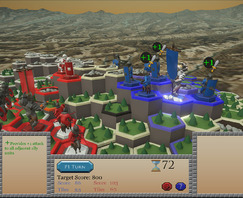
Academics . Game Design . Courses
Game Design Courses
Intro Game Design
Course No. GAME 215 Credits: 3.0
Introduction to Game Design takes students on an exploration of Gaming Theory and its practice through the development of physical games. Investigation includes game metaphor, story, game mechanics, and chance factors. Students will also analyze games and gameplay including the aesthetics of games and the design of their instructions. In this project based course students will produce fully implemented board games and card games. 3 credits.
Introduction to Video Games
Course No. GAME 216 Credits: 3.0
Game design allows artists to create meaningful play and interactive experiences. This introductory course explores games through the development and creation of 2D video games. The course aims to provide a critical vocabulary and historical context for analyzing games and gaming theory and focuses on the skills and techniques necessary to incorporate game design into an ongoing art practice. 3 credits.
Serious Game Design: Theory + Application
Course No. GAME 308â€"408 Credits: 3.0
This course introduces the fundamentals of serious or educational game development. The course materials and projects will help students understand how and why games can be used for learning in the fields of health, medicine, science and games for social change. The course exposes students to examples of the current work and research in game design mechanics, game learning mechanics and assessment mechanics; which are integral to development of successful educational games. Students will be exposed to industry-specific serious games (games for learning, corporate training, news games, games for health, science, exer-games, military games, and games for social change.) These examples, along with specific lecture topics and materials, will allow the student to understand how to develop their own serious game projects by learning specific research methods for understanding content, players and engagement strategies. 3 credits.
Game Testing + Level Design
Course No. GAME 318 Credits: 3.0
Game Testing and Level Design will be covered as player elements, the game play experience, creating world levels, creating the game interface and creating the atmosphere. In addition, students will learn how to create Game Content for commercial game engines and learn how to set up origination skills for commercial game engines. Students will learn how to create texturing mapping, brushes, light maps etc. 3 credits.
Game Media Production I (EP)
Course No. GAME 320 Credits: 3.0
The course is a project driven course jointly offered between Cleveland Institute of Art and Case Western Reserve University. Students will form production teams and collaborate with them using their talents and expertise to develop a working prototype computer game; having an interactive and immersive experience. Students will take on roles of game producers, developers, artists, programmers, and designers. You will learn to brainstorm, design documentation, assemble resources, create assets, implement the game design, and manage their individual tasks and collective project. The course introduces students to the contemporary challenges posed by the ever-changing technologies used to make and deliver video games on today’s sophisticated hardware. This course will bring together an interdisciplinary group of advanced undergraduate students to focus on the design and development of a complete, fully functioning computer game prototype. The student teams are given complete autonomy to design their own fully functional games from their original brainstormed concept and research to a playable finished prototype, i.e., from the initial idea through to the designed game brand. The student teams will experience the entire game development cycle as they execute their projects. An excerpt of example responsibilities include (but not limited to): creating a game idea, writing a story, developing the artwork, designing characters, implementing music and sound effects, programming and testing the game, and documenting the entire project with a formal “Design Document” and demonstration with oral presentation. Fulfills Engaged Practice requirement. 3 credits. Course repeatable for a maximum of 6 credits.
Game Media Production II
Course No. GAME 321 Credits: 3.0
This course serves as a continuation of the fundamentals and theory application of game development. The course materials and projects will help students understand how to further develop game concepts, mechanics, interaction design, and prototype the game through the use of animation and simple interactivity. The course will require students to work individually to design game narratives, concepts, design documents (art assets, technical assets and sounds assets) and demonstrate the playability of the prototype game. The course exposes students to examples of the current work and research in game theory and narrative design, which are integral to development of successful polished games. Students will be exposed to industry-specific games with the requirement to test, analyze and review. These examples, along with specific lecture topics and materials, will allow the student to understand how to continue to develop their own game projects by learning specific research methods for understanding content, players and engagement strategies. This course does not require programming skill or experience per se; however it is understood that the student usage of Unity (in the Game Development SP2014 course,) and/or UDK may be used for projects with limitations on coded interactions and time constraints. If you wish to create a digital game but do not have technical experience to achieve the full results, you will be required to show an animation of the game concept and prototype in action, with narrative, character/environmental style, GUI, HUD, scoring, mechanics, level design, and instructional prompts. Alternately, you may choose to work on a non-digital game, which notes a similar level of complexity. Please note that this course welcomes both digital and non-digital games, but that the requirements and milestones for each type of game will be somewhat different and require the development of design related documentation, assets and research. 3 credits.
Introduction to Game Development
Course No. GAME 322 Credits: 3.0
The course is designed to teach students about the various elements of game development. Students will work to utilize modern tools to develop 2D/3D graphical assets into an interactive game engine through the use of programming. A focus will be applied to skill learning while additional topics and theory will be covered to provide a well-rounded experience. 3 credits.
Introduction to 3D Modeling
Course No. GAME 345 Credits: 3.0
The course is designed to cover concepts in digital 3D organic and device model construction, whereby the virtual models designed are rendered and composited for 2D illustration purposes to solve specific conceptual problems. The subject matter within the Game Design curriculum reflects the development of characters, game environments and specific assets for game development. Students outside the Game Design Major, are required to work with subjects appropriate to their major field of study for concept development and for long term portfolio objectives. Projects include concepts and workflow for constructing a virtual 3D surface by: (1) defining the visual problem within a concept sketch in pre-production, (2) utilizing specific introductory modeling methods to build the 3D illustration components, (3) the use of basic lighting and rendered materials, (4) export methods into Adobe Photoshop for augmentation, finishing and final illustration techniques and layout. Projects require the student to gain and improve upon conceptual skills, problem-solving in specific media situations (digital 2D & 3D) and technical proficiency at an introductory level in 3D modeling. 3 credits.
Meet Your Faculty view all
Harrison Walsh
Professor of Practice
Harrison has been teaching game design for 13 years at three colleges. During this time, he has also worked on...more
Featured Student Work view all

Our connections are your connections.
While at CIA, you'll learn from the masters through our rigorous, world-class curriculum and connect with working professionals to begin your career.


